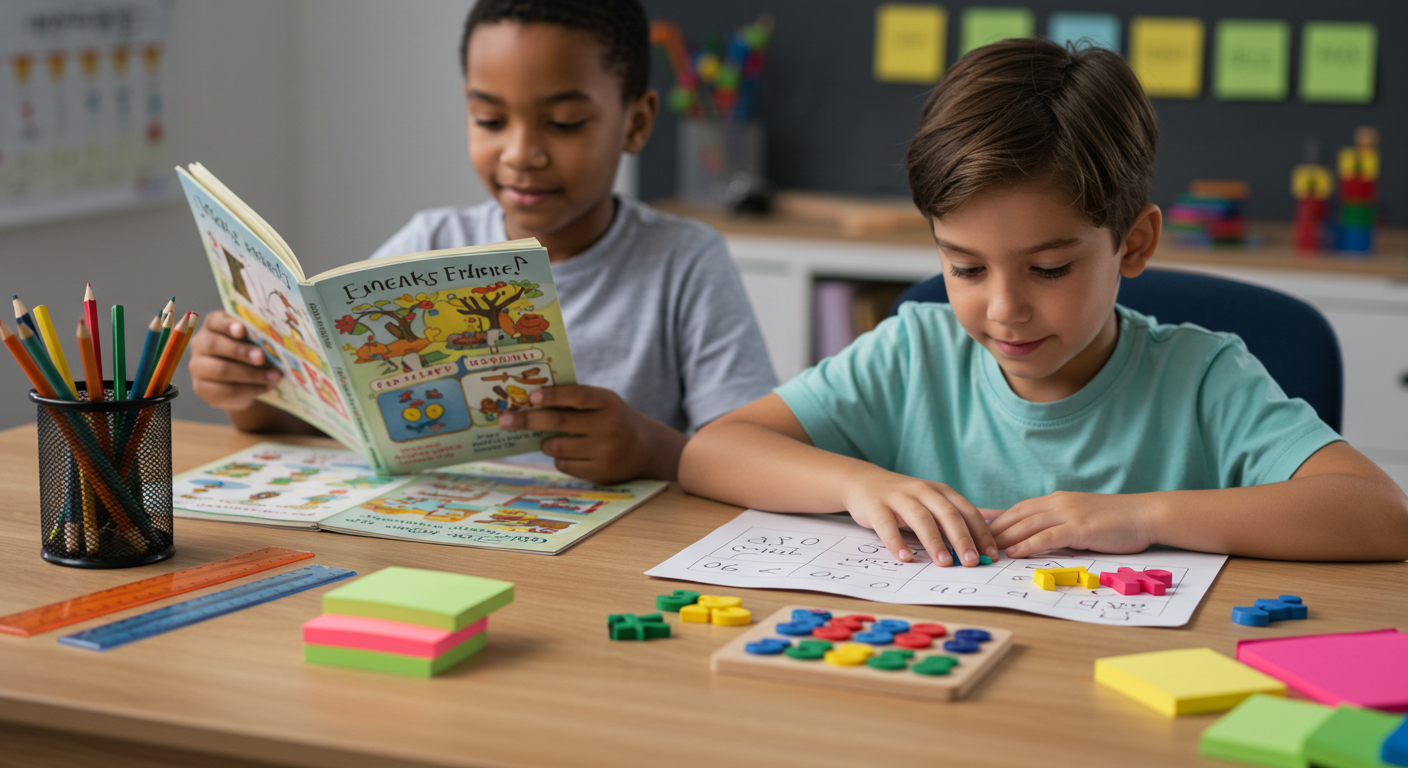
How to Know If Your Child Is Ready for the 11 Plus Exam
Some children fly through practice questions but panic when timed. Others are bright but can’t sit still for more than ten minutes. And some seem switched off entirely—until they suddenly decide they care.
This is why knowing if your child is truly ready for the 11+ exam isn’t as simple as looking at their school report or tutor’s notes. Readiness is less about raw ability and more about mindset, focus, and how your child responds to challenge. You’re not just preparing them to answer questions—you’re preparing them to perform under pressure, with confidence and clarity.
This applies across all subjects—whether it’s English, maths, verbal reasoning, or non-verbal—because success depends on how your child handles the material, not just what they know.
Here’s how to know if your child is ready for the 11 Plus exam.
1. They Can Focus Without Constant Supervision

One of the earliest and clearest signs of readiness is the ability to work with genuine focus. Not perfectly, not for hours—but long enough to show intent and concentration.
If your child can sit for 30 to 40 minutes without needing to be reminded every five minutes, that’s a strong sign. They might fidget. They might complain. But if the work gets done and the effort is steady, they’re beginning to develop the stamina needed for timed exam sections.
If, on the other hand, you need to hover constantly, repeat instructions, or negotiate every task like a battle, you may be looking at a child who isn’t quite ready to self-manage. That doesn’t mean they won’t get there—it just means they’re still building that habit.
2. They Can Handle Mistakes Without Meltdown
The 11+ is designed to be challenging—your child will get things wrong, especially in the early stages of prep. Readiness isn’t about getting perfect scores. It’s about being able to cope with mistakes without falling apart.
If your child is able to:
-
Stay calm after a tough question
-
Try again after correction
-
Ask why something is wrong, instead of shutting down
—then they’re building the resilience the exam demands. On the flip side, if every wrong answer triggers tears, frustration, or avoidance, then their emotional response may still be too raw for exam conditions.
This isn’t just about attitude. It’s about whether your child can stay present when things get hard. That’s what they’ll need on exam day—and in every timed mock along the way.
3. They Have Core Strength in English and Maths

There’s no need for mastery in every topic, but your child should be secure with the basics before moving into full 11+ prep. That means:
-
Confident arithmetic (addition, subtraction, multiplication, division)
-
A good grasp of grammar and sentence structure
-
Able to read and understand short passages without being spoon-fed
If your child still hesitates with times tables or skips key steps in written maths, you may need to pause formal prep and shore up foundations. The same goes for comprehension—if they struggle to extract meaning from a short text, verbal reasoning and advanced inference will feel like a brick wall.
This doesn’t mean they can’t prepare. It means the prep should start with building blocks, not full papers. And since different formats of 11+ exams test skills in different ways—some with multiple choice, others with written responses—it’s important that those core skills are in place before tailoring prep to a specific exam style.
4. They Can Work at Speed Without Losing Control
Speed matters in the 11+. But so does control. A child who rushes through everything to “get it over with” is no more ready than one who crawls through every question and runs out of time.
The sign you’re looking for here is measured pace. Can they move through five or ten questions in a reasonable time without freezing or scribbling random guesses? Do they skip and come back rather than waste time on one sticking point? Can they speed up without getting sloppy?
This doesn’t happen overnight—but you’ll start to notice it once they’ve had practice in short timed bursts. When they stop panicking at the timer and start using it to stay focused, that’s readiness in motion.
5. They’re Starting to Take Ownership

A subtle but powerful signal of readiness is when your child starts to drive their own progress. That might look like:
-
Asking for help with specific question types
-
Wanting to redo a practice paper to beat a previous score
-
Highlighting areas they know they need to review
It doesn’t need to be dramatic. You’re not expecting a fully self-directed learner at age 9 or 10. But if you’re seeing moments where they show pride, curiosity, or initiative—it’s a sign that they’re not just going through the motions. They’re starting to invest.
Ownership builds momentum. And momentum is often what separates children who cope with the 11+ from those who simply survive it.
6. They’re Curious, Not Just Compliant
A child who’s ready doesn’t just do what they’re told. They engage. They ask questions, poke at logic, and want to understand how things work—even if they don’t say it with a smile.
You might see it in the way they try different methods on a maths problem, ask why a word means what it does, or push back on a grammar rule until it makes sense. That’s a good thing. Curiosity shows your child is mentally present and trying to connect ideas, not just follow instructions.
If they’re only working because they’re told to—or worse, because they’re afraid not to—they may get through the practice. But they won’t build the flexibility and confidence the 11+ really tests.
7. You’re Not Having to Drag Them Through It

Some grumbling is normal. But if every session is a negotiation, every task a battle, and every page a source of tension, that’s a red flag. Readiness doesn’t mean they enjoy prep—but they should show some willingness to engage, even if it’s just “let’s get it done.”
Children who are ready may still resist now and then. But they don’t treat the whole process like a punishment. They’re starting to accept it as something they’re part of—not just something that’s being done to them.
If your child only works under pressure, only focuses when you sit beside them, or spirals the moment they make a mistake, the issue may not be ability. It may be that they’re not emotionally in the right place yet.
8. When They’re Not Ready—And What That Looks Like
Not being ready doesn’t mean your child isn’t bright. It simply means the exam environment, pace, or process isn’t something they can handle yet. And pushing through it anyway often does more harm than good.
Common signs include:
-
Emotional shutdowns or extreme frustration during practice
-
Constant second-guessing or random guessing
-
Zoning out, refusing to start, or “forgetting” homework regularly
-
Wild swings in ability depending on mood or time of day
These aren’t character flaws. They’re signals. And if you’re seeing them consistently, it may be wiser to pause, scale back, or revise your timeline. Many children who aren’t ready at age 9 are perfectly equipped a few months later—once the right habits, confidence, and maturity click into place.
Conclusion: Readiness Is a Pattern, Not a Perfect Day

No child ticks every box every time. Readiness doesn’t mean your child sits down smiling, finishes everything with top scores, and asks for extra homework. It means you’re seeing consistent signs that they can focus, recover, push themselves, and stay steady.
If those signs are there—even imperfectly—you’re probably on the right track.
And if they’re not there yet, that’s not failure. That’s feedback. The right prep is never just about content—it’s about timing. Give your child what they need now, and revisit when they’re ready to rise to it.
That’s how you set them up to succeed. Not just on test day, but far beyond it.
FAQs
1. What age should my child be when they start 11+ prep?
Most children start formal prep in Year 5, but readiness isn’t really about age. Some are steady and focused at nine; others need more time to mature. Go by behaviour and mindset, not just the school calendar.
2. My child is smart but hates making mistakes—does that mean they’re not ready?
Not necessarily, but it’s something to pay attention to. If they can’t handle getting things wrong without frustration or shutting down, emotional readiness may need a bit more time to catch up with ability.
3. What if they’re great at school but can’t handle timed practice?
That’s actually very common. School learning is paced differently than 11+ exams. Timed work is a separate skill—if they’re not there yet, it can be developed gradually.
4. Should I still go ahead with prep if they’re not showing interest?
Only if you’re keeping it light. If you’re dragging them through every session, it often does more harm than good. Better to pause and revisit when they’re more open and less resistant.
5. How do I know if they’re “strong enough” at English and maths?
They don’t need to be top of the class, but they should be secure with the basics—mental maths, grammar, comprehension. If they’re still guessing or forgetting steps, focus on that before moving into exam-style work.
6. Can I still prepare them even if they’re not ready yet?
Yes—just shift the focus. Stick to building core skills, vocabulary, logic puzzles, and reading habits. The goal is to keep them learning without adding pressure.
7. What if I wait too long and miss the right window?
The right time is when your child can genuinely benefit from the prep. Rushing early often leads to stress and burnout. It’s better to start slightly later with confidence than early with anxiety.



